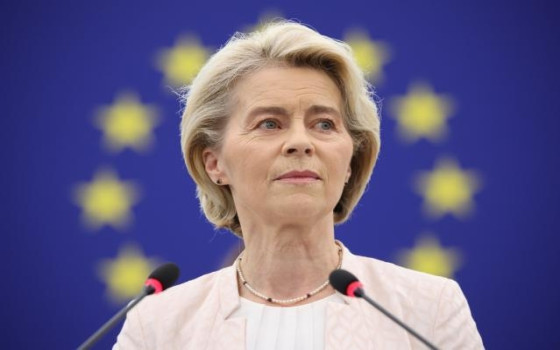
Commission: Radical redesign of the EU budget, amounting to nearly two trillion euros. Observers: The atmosphere appears calm and bureaucratic on the outside, while it was chaotic and political behind the scenes.

- Europe and Arabs
- Thursday , 17 July 2025 11:26 AM GMT
Brussels: Europe and the Arabs
The European Union's massive budget for the next seven years has finally been announced. As is typical in Brussels, it appeared calm and bureaucratic on the outside, while behind the scenes it was chaotic and political. The Commission clearly began, as it intends to continue, the next two years of arduous negotiations. According to the European edition of Ulitico magazine, "Playbook," under the headline "Key Figures," the Commission presents the budget as "close to" €2 trillion, although a portion of it will be allocated to repaying the Union's debt after the COVID pandemic. The programs themselves are worth €1.816 trillion. She added, "The commissioners received the final plan moments before they were supposed to sign it - and they were receiving updates from media reports instead of their president. The ambassadors did not have the documents during the meeting they were supposed to discuss. The Commission's presentation referred to figures as high as 101% of the budget. MEPs were unable to see the figures before their meeting with the Commission to discuss the plan, and budget official Piotr Serafin arrived four hours late.
Meaning: Brussels spent an entire day discussing a crucial document that no one had seen, with only the Commission's PR statement at the ready.
Mysterious calculations: No one could understand how such huge sums were raised. At the press conference, a tired-looking Ursula von der Leyen ran through figure after figure from the PR statement, but dodged questions from confused journalists about the details of the figures.
Playbook's Gregorio Sorgi reports on what happened inside the European Parliament building as the budget announcement approached - that von der Leyen's tight control over the figures and her refusal to discuss them in advance meant she had to make significant concessions. At the last minute.
The knives are drawn: As soon as von der Leyen took the Berlaymont podium, criticism poured in. The budget is either too big (the Frugals, Germany), insufficient (the Socialists), or undemocratic (the European Parliament), exploiting everyone from farmers to regions to the climate to people with disabilities.
You can't please everyone: Despite von der Leyen's centralism and discretion, one point remains: the EU budget is impossible to win, no matter who is in charge. Everyone wants the money. No one wants to pay.
The battle ahead: The budget needs to be approved by all EU countries and the European Parliament by 2027. So prepare for two years of this.
A statement issued by the Socialist and Democratic Party (S&D) group in the European Parliament, a copy of which we received, said that the S&D cannot agree to the proposed budget because it does not serve the interests of Europeans. Its size is inadequate to meet the EU's current challenges.
In the statement, Iratxi García Pérez, president of the S&D group, said:
"We cannot achieve more with less." Any idea of making access to EU funding conditional on austerity measures is completely unacceptable. We all remember the disastrous, long-term impact this had on our 27 economies and societies fifteen years ago. For this reason, the proposed proposal does not enjoy our support, as it is not in the interest of the people and requires serious improvement.
This came after the European Commission presented its proposal for an ambitious and dynamic Multiannual Financial Framework (MFF), worth nearly €2 trillion (or 1.26% of the EU's GNI on average between 2028 and 2034). This framework will provide Europe with a long-term investment budget that meets its ambitions to become an independent, prosperous, secure, and prosperous society and economy over the next decade.
Europe faces growing challenges in many areas, such as security, defense, competitiveness, migration, energy, and climate change adaptation. These challenges are not temporary; rather, they reflect systemic geopolitical and economic shifts that require a robust and forward-looking response. Therefore, the Commission proposes a radical redesign of the EU budget, making it more streamlined, flexible, and impactful. This budget will significantly strengthen the EU's ability to implement its core policies while addressing new and emerging priorities. It will continue to support individuals, businesses, Member States, regions, partners, and, most importantly, the EU's collective future.












No Comments Found